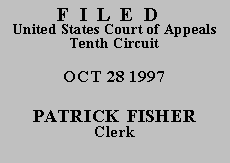

| LARRY W. SARNER, an individual
and alleged general partner,
Plaintiff-Appellant, v. PETER PAUL LUCE, an individual and alleged general partner; MURRAY RICHTEL, State District Judge for the District of Boulder County, Division 3; JUDICIAL ARBITERS GROUP, a Colorado private arbitration and mediation business, Defendants-Appellees. |
|
Plaintiff commenced a 42 U.S.C. § 1983 civil rights action alleging that defendants, a private individual, a state court judge, and a court-appointed receiver, deprived him of property without due process. The alleged deprivation occurred in the course of state court litigation to dissolve a de facto partnership during which the judge appointed the receiver at the request of the private individual. Plaintiff sought injunctive relief against all three defendants and damages against the private individual and receiver. The district court dismissed the action under Fed. R. Civ. P. 12(b)(6) for failure to state a claim upon which relief may be granted.
We review a dismissal under Rule 12(b)(6) de novo. See Chemical Weapons Working Group, Inc. v. United States Dep't of Army, 111 F.3d 1485, 1490 (10th Cir. 1997). We will uphold the dismissal "when it appears that the plaintiff can prove no set of facts in support of the claims that would entitle him to relief, accepting the well-pleaded allegations of the complaint as true and construing them in the light most favorable to the plaintiff." Yoder v. Honeywell Inc., 104 F.3d 1215, 1224 (10th Cir.) (further quotation omitted), cert. denied, 66 U.S.L.W. 3246 (U.S. Oct. 6, 1997) (No. 96-1848). Applying this standard, we affirm.
Plaintiff argues with respect to defendant Luce, the private individual, that the district court erroneously determined that plaintiff failed to prove state action necessary for a § 1983 action. Specifically, plaintiff objects to the district court's interpretation of Lugar v. Edmondson Oil Co., 457 U.S. 922 (1982), and the court's subsequent determination that plaintiff failed to assert facts showing a conspiracy between Luce and the other defendants to deprive plaintiff of his constitutional rights.
We agree with plaintiff that Lugar merely held that conspiracy meets the test for state action, but is not the definitive standard for determining whether there is state action. See also Gallagher v. Neil Young Freedom Concert, 49 F.3d 1442, 1453-54 (10th Cir. 1995). The framework for state action set forth in Lugar analyzes (1) "whether the claimed constitutional deprivation resulted from the exercise of a right or privilege having its source in state authority" and (2) "whether the private party charged with the deprivation could be described in all fairness as a state actor." Edmonson v. Leesville Concrete Co., 500 U.S. 614, 620 (1991). State action may be found when a "private part[y] make[s] extensive use of state procedures with 'the overt, significant assistance of state officials.'" Id. at 622 (quoting Tulsa Prof'l Collection Servs., Inc. v. Pope, 485 U.S. 478, 486 (1988)); see also Cobb v. Saturn Land Co., 966 F.2d 1334, 1337 (10th Cir. 1992) (county clerk's acceptance and recording of lien materials and issuance of filed notices not enough to be overt and significant help for state action sufficient to implicate due process).
Applying this standard to this case, we conclude as a matter of law that plaintiff did not establish state action on the part of defendant Luce. See also United States v. Sandoval, 29 F.3d 537, 542 n.6 (10th Cir. 1994) (permitting affirmance on any ground for which there is record to permit conclusion of law, even if affirmance is on ground not relied upon by district court). Plaintiff failed to plead overt or significant action by the other defendants such that defendant Luce was a state actor. Even if the other two defendants had acted improperly, there was no state action. See Torres v. First State Bank, 588 F.2d 1322, 1325-27 (10th Cir. 1978).
Plaintiff argues the district court erred in determining that the federal courts lacked jurisdiction to grant injunctive relief against defendant Richtel, a state trial court judge. Plaintiff disagrees with the district court's finding that plaintiff essentially sought review of state court decisions. Rather, plaintiff believes that federal courts can enjoin state court proceedings litigating the rights of a person, such as plaintiff, who has not been made a party to the state proceedings. We conclude, for substantially the same reasons stated by the district court, that the district court correctly decided it lacked jurisdiction to grant injunctive relief.
With respect to the damage claim against defendant Judicial Arbiter Group, Inc. (JAG), the receiver, plaintiff argues the district court erred in determining that JAG has judicial immunity as a court-appointed receiver and did not act outside the scope of its judicial authority. Plaintiff also challenges the district court's determination that the request for injunctive relief against JAG is moot in light of involuntary bankruptcy proceedings against United States Voting Machines, Inc., the subject of the receivership proceedings. For substantially the same reasons stated by the district court, we agree with the district court's determinations.
The judgment of the United States District Court for the District of Colorado is AFFIRMED. Defendants' request for attorney's fees and costs is DENIED. The mandate shall issue forthwith.
Entered for the Court
Circuit Judge
*. This order and judgment is not binding precedent, except under the doctrines of law of the case, res judicata, and collateral estoppel. The court generally disfavors the citation of orders and judgments; nevertheless, an order and judgment may be cited under the terms and conditions of 10th Cir. R. 36.3.